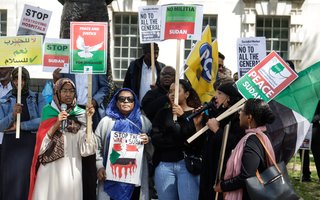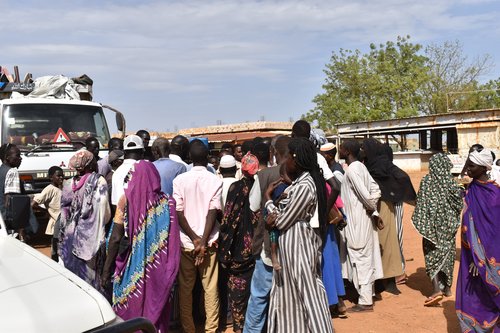Sudanese peacebuilders as refugees: Activism amid insecurities
Sawssan Abou-Zahr shares the stories of two peacebuilders from Sudan who are striving to continue their work after being displaced by conflict. They describe their experience fleeing Sudan and their hopes for post-war peacebuilding.

It was supposed to be an ordinary fasting day during the holy month of Ramadan. Little did they know that their lives would be turned upside down in Khartoum, as Sudan was thrust into yet another civil war. For the first time, it hit the capital.
Rasha Ahmed, the Executive Director of Collaborative for Peace, woke up on 15 April to loud bombings that shook her house. She crawled on the floor to move from room to room.
Suhair Mahdi, a human security expert at Maaman, experienced a similar ordeal.
A dangerous escape
Rasha
When Rasha’s husband went out to get water supplies, armed men from the Rapid Support Forces (RSF) – a paramilitary group that evolved from the notorious Janjaweed militias – held a gun to his head.
Three days later, Rasha decided to leave Khartoum after her children – a ten-year-old girl and eight-year-old boy – both fell physically ill due to their overwhelming fear. The opportune moment arose when the army launched air attacks, forcing the paramilitary fighters to retreat.
Rasha explained: “We assessed the risks. A raid was ironically safer than the hazards on the road,” However, they were caught in the middle of a fierce firefight, after which they all saw piles of dead bodies.
Their week-long stay in Oumdurman, northwest of Khartoum, was a ‘healing process’ for them, both psychologically and physically – Rasha had developed hearing problems during the bombings in Khartoum. But the conflict soon spread to Oumdurman, so Rasha and her family fled to Egypt before it imposed entry visas on all Sudanese citizens.
Suhair
On Eid el Fitr, which fell on 21 April, Suhair received a call from her traumatised daughter. Her neighbour had just been killed. They both agreed that it was time to leave Khartoum. They were 12 people in all: Suhair, her daughter Iman (who later took part in Cannes film festival), two of her other daughters, their husbands and the six grandchildren. She recalled: “We went out to the unknown. We could have been robbed, killed or raped… Three acquaintances were shot at an RSF checkpoint…”.
After a perilous journey, they reached Cairo and rented an apartment. Friends and relatives were forced to pay double the cost shortly after. Some people took advantage of the crisis, imposing high fees in US dollars on Sudanese refugees. Suhair said many returned back home, despite the dangers, because they had run out of money.
Daily burdens
When asked about their experience living as refugees, Rasha said it was an “ongoing trauma... I want to enroll my kids in a school here… the news in Sudan is heartbreaking: inmates escaped prisons; schools and hospitals are being destroyed or looted; the electricity is down.”
Suhair, on the other hand, spent weeks worrying for her fourth daughter, who only reached Cairo with her two children in late June. Her route was more dangerous than theirs, and at the time of writing her husband is still awaiting a visa.
Suhair said, “I was helpless. I had to take care of my family first. Women need safe and affordable places. Many are willing to work as domestic helpers. They had careers but left behind their university degrees. They need legal residency; we only got one for six months, which doesn’t allow us to get employed.”
Rasha, too, is concerned about underprivileged female refugees whose male relatives are denied entry to Egypt. Despite lacking financial means, they have become the sole breadwinners for their families and might face harassment, including sexual assault.

Refugees from South Sudan, displaced for a second time, were stranded in urban areas of Rabak. Some had been living on the streets for days. UNHCR photo from 30 April 2023.
Peacebuilders turned refugees
Rasha wants the world to know Sudanese women denounce violence. She believes that peacebuilders turned refugees should reconnect with the international community to resume their activism, although they need financial and psychological help.
Rasha herself recently joined groups that are fighting hate speech to avoid conflict with Egyptians struggling with an unprecedented financial crisis. Additionally, she started the process of registering her organisation in Cairo, while remotely collaborating with colleagues in Port Sudan and Darfur to expand support to the people in those regions, including internally displaced persons and refugees from Nigeria and Ethiopia.
Suhair’s worries extended to the fate of cancer and dialysis patients whose care is disrupted, as well as women’s safety. She spoke about incidents of rape and connected me to Hind Mahmoud, a gender expert running the Sudanese Women’s Health Organization. At the time of writing, Hind had documented 11 verified cases in Khartoum Bahri district and Oumdurman. Her team had also received requests from rights groups for ‘rape kits’, designed to prevent unwanted pregnancies and sexually transmitted diseases.
Hind told me about three, possibly five, girls aged 12 to 16 years old who are believed to have been raped in Kafouri, Khartoum Bahri. Their fates remain unknown. I saw a disturbing video of a rape there, but Hind couldn’t confirm whether it involved one of them.
As of 29 June, the governmental Combating Violence Against Women Unit had recorded 88 confirmed cases of rape, with 42 in Khartoum. It estimated that these figures represent only 2% of the actual incidents.
Rasha said some survivors of rape had relocated to Cairo, where they lack essential psychological and medical assistance. She emphasised that a hotline must be set up for them and, most importantly, that their cases must be documented to seek justice.
Post-war peacebuilding
Suhair and Rasha both argued that peacebuilding throughout this war and afterwards should be holistic and inclusive of women.
“We’ll start from scratch. Our houses were looted, so was the data of our organisation”, Suhair revealed.
“It is time for a new Sudan run by women and peacebuilders working towards common ground between ethnicities and religions… Everything was centralised in Khartoum; when the capital fell, all aspects of life collapsed. We need human security plans around the country, especially with increasingly scarce natural resources due to climate change; as well as to address racism and social injustices,” she added.
Sudan’s revolution of 2018-2019, led by youth and women, was hijacked by a military coup – a known pattern in a country with fragile civil governance and democracy. As frustrating as it was, peacebuilding still needs youth and women working for accountability and reconciliation, even with the ongoing aggression, “or else wars will keep recurring”, Suhair said.
Rasha called for a revision of military doctrines and the abolishment of non-state armed groups so that civil experts, both male and female, could rule the country instead.
As she anticipates the war to last for another year or two, she spoke of a “daily step-by-step” for peacebuilding: “taking care of ourselves, getting work permits, avoiding conflicts with our host communities and documenting human rights violations.”
Meeting a Yemeni refugee in Cairo helped her heal. In fact, that woman had previously had similar encounters with Syrians and Libyans. “We are learning from other refugees, but we will regain control of our lives and country,” she concluded.










